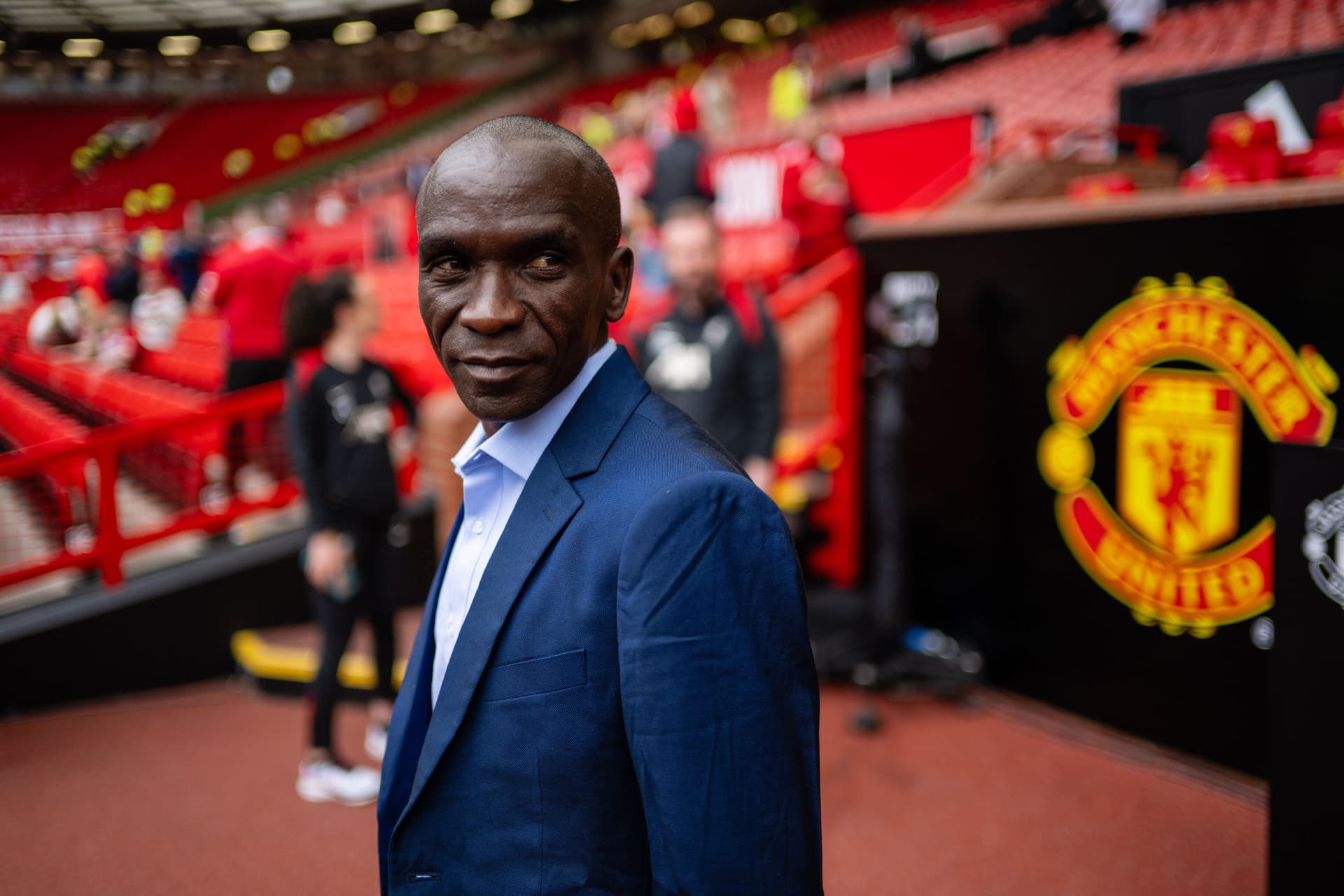Olympics
Eliud Kipchoge Reveals Lessons from Paris Olympics and Challenges Federations to Prioritise Athlete Welfare
Marathon legend Eliud Kipchoge reflects on the 2024 Paris Olympics, urging sports federations to prioritize athlete welfare and invest in their mental and emotional well-being beyond just trophies.

Image Credits: Ash Donelon/Manchester United via Getty Images
The 2024 Paris Olympics marked exactly two decades since double Olympic marathon champion Eliud Kipchoge made his Olympic debut.
The legendary marathoner first ran in the Athens Olympics in 2004 where he won the 5,000m bronze medal before upgrading to silver four years later in Beijing in the same event.
By 2008, Kipchoge had already been an established name in distance running, boasting two world championship medals and two at the Olympics.
This year, the legendary marathoner led team Kenya to the Olympics together with a strong contingent that included 2024 TCS London Marathon champion Alex Mutiso and 2022 Chicago Marathon winner Benson Kipruto.
A Painful Exit for the Marathon Legend
Kipchoge, who was just shy of his 40th birthday, was headed for another highlight in his celebrated marathon career. He was aiming to get back to winning ways, or at least reach the Olympic podium for a fourth time in his fifth Olympic Games.
The running guru stayed at a touching distance of the leading pack up to the 15km mark. Then he began holding his waist, early worrying signs that all was not well for the defending Olympic champion.
The pain intensified forcing him to take a difficult decision, to end his race about 12 km away from the finish point at Les Invalides. That saw him record a Did Not Finish (DNF) for the first time in his illustrious career. Before the Olympics, Kipchoge's worst marathon result was 10th place at the 2024 Tokyo Marathon.
It was a classy exit for the marathoner who set a world record in the 5,000m of the World Cross Country Championships’ junior race in 2003 and won gold. That would be the scene of the marathon’s great last Olympic parade.
Lessons from Paris
Reflecting on the recent Paris Olympics, Kipchoge outlined the key lessons learned, urging sports leaders in the country to take stock of past experiences and ensure they inform future strategies.
“One thing I learned and observed during the Olympics is that peace and education play a great role in our generation. The combination of the two is magical. Now we are done with Paris. Los Angeles is up next. Can we apply the lessons learned as we head to the next Olympics?” he posed to SportsBoom.com.
A Call for Change in Sports Culture
Kipchoge also expressed concern over how Kenyan athletes are often treated, drawing a parallel to weddings where people focus on celebrating the event rather than the bride and groom.
He pointed out that in sports, much like in weddings, the spotlight is frequently on the events themselves, while the athletes, who are the real protagonists, do not receive the recognition and support they deserve.
That is how we operate. We celebrate the events and not our athletes, which should not be the case.
Eliud Kipchoge
The marathon star also challenged the traditional approach of simply rewarding athletes with trophies, urging for a more profound investment in their mental and emotional well-being. He added that equipping athletes with practical skills that can sustain them beyond their sporting careers.
“It is the work of federations and the Ministry to make sure athletes are comfortable. Athletes should be taught literacy, handling pressure at emotional and physical state. Do not just award them trophies. Work on their minds as well. Can we teach our athletes basic skills like using social media channels to earn money?” he posed.
A Farmer’s Patience: Advise to Sports Federations
Kipchoge also urged sports federations and the Ministry to invest in athletes with the same patience and care that a farmer applies when planting a seed, waiting for it to germinate and eventually yield a good harvest.
“To our federation leaders, let us hold sports in the heart and mind. Train our athletes, invest in them, and eventually wait for the results. What athletes do behind the scenes is commendable. They are the people who build the game by their hands,” he averred.
He concluded by calling on sports federations and sponsors to go beyond simply funding events and trophies, stressing the importance of investing in the well-being of athletes.
“To our sponsors, I challenge you to include humanity in your budget. Finance these athletes for the good work they are doing,” he said.
Despite the unexpected turn in his last Olympic hurrah, the two-time world record holder has no intentions to call time on his career, not just yet.

Mary Milanoi is a young Kenyan sports journalist known for her insightful reporting and passionate storytelling.
Her work is characterized by her ability to connect with sportspersons and bring their stories to life, capturing the human element behind the competition.